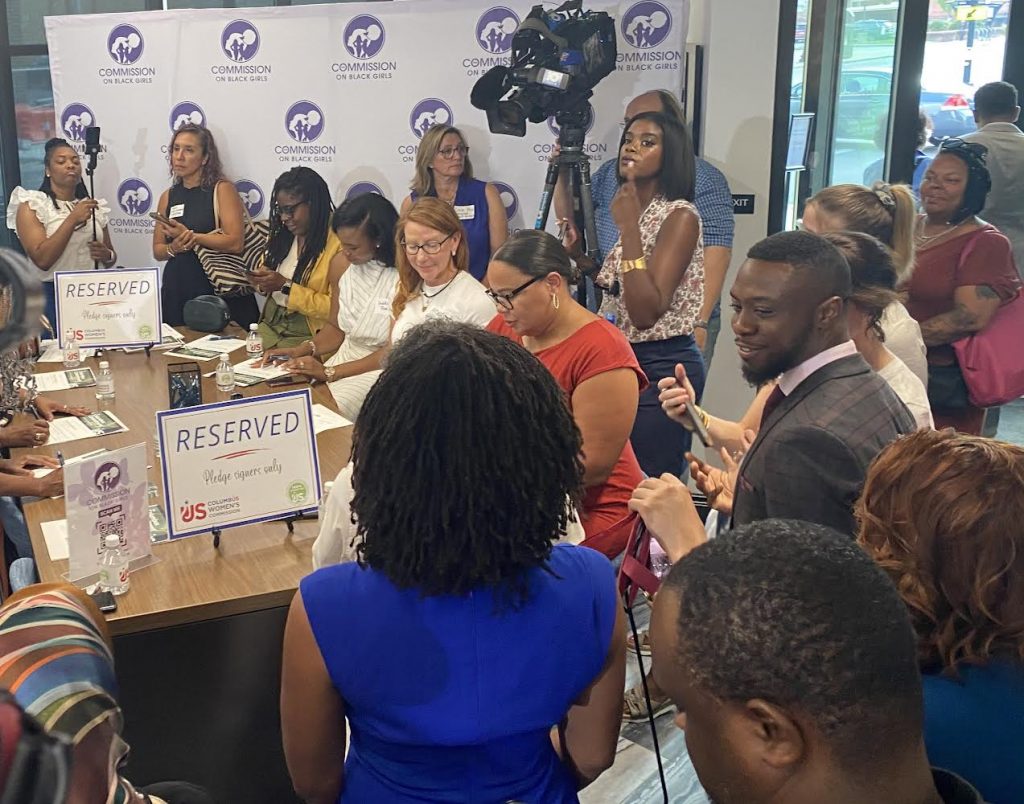By Okon Ekpenyong
Mayor Ginther, Councilmember Shayla Favor, and other members of the Columbus community gathered Thursday evening at the Adelphi Bank headquarters to honor and Mark July 27th as Black Women’s Equal Pay Day in Columbus.

Mayor Ginther emphasized investing in Black women to create an equitable and prosperous city. He pledged to work with the city’s partners to eliminate the wage gap and ensure that Black women have the same economic opportunities as all other residents of Columbus. In addition to Columbus, other cities throughout the nation continue to support Black Women’s Equal Pay Day by not only raising awareness but also by urging governors, state officials, and lawmakers to take action because minority women continue to face high unemployment, occupational segregation, racism, and sexism in the workplace.
There is an estimated 64-up cent wage gap between a woman and a man. Also, per experts, Women are often undervalued, underappreciated, and overworked, but underpaying remains an issue.

Women’s and civil organizations, labor unions, professional associations, and others formed the National Committee on Pay Equity in 1996 to combat sex and race-based wage discrimination. Since then, various Equal Pay National Days have brought attention to the cause, such as AAPI on March 14th, International Equal Pay Day on September 18th, Native American Equal Pay Day on November 18th, and Black Women’s Equal Pay Day on December 19th.
These influential leaders discussed finding ways to create a more equitable workplace. They identified the importance of leveling the playing field by providing equal pay for equal work, closing the gender wage gap, and supporting women and minority-owned businesses. They discussed how Columbus is leading the way and helping create solutions to ensure everyone is treated fairly and compensated appropriately for their work.

In Columbus, city leaders are doing their part with the help of the Columbus Women’s Commission to continue to fight to end Sex and Race-based wage Discrimination. Thursday’s evening gathering at Adelphi Bank, the first Black-owned banking institution in Central Ohio, included signing the Columbus Commitment: Achieving Pay Equity initiative with the Columbus Women’s Commission. This initiative seeks to eliminate the wage gap between Black women and their male counterparts.
Among the guest speakers at the event were First Lady Shannon Ginther, whose the chair of the Columbus Women’s Commission, Councilmember Shayla Favor, Director Carla Williams-Scott from the Columbus Department of Neighborhoods, Greta Russell, Adelphi Bank Inaugural Board Member, and Sherrice Thomas from the Columbus Chamber of Commerce. They convened to discuss the wage gap and possible solutions to achieve pay equity in the workplace.

“Adelphi Bank’s mission is to improve customers’ lives by removing barriers to the financial equity Act. At the bank, we strive not just to be a bank for the people but also an advocate and a champion for the we serve,” said Greta Russell of Adelphi Bank. In her speech, Russel also mentioned the Paycheck Fairness Act, which received applause from the attendees. Congress passed the Act in 2021, which addresses age discrimination based on sex, including pregnancy, sexual orientation, gender identity, and sex characteristics. However, it never passed the Senate because of opposition.
The bill would allow workers to sue their companies for punitive damages for wage discrimination. As a result, employers must do the right thing during the initial hiring process to avoid severe consequences. A grateful Russell introduced Mayor Ginther and praised his efforts for working tirelessly to lead the city to being named the opportunity city. “There’s not a better place for us to come together to talk about black Women’s Equity Pay Day than here at Adelphi,” said Mayor Ginther.
“In a city built around equal opportunity for all, all women deserve equal pay for equal work and have their work valued and compensated equitably in relation to their male peers.” “Black Women’s Equal Pay Day shows the power of collective action from the Columbus Women’s Commission, Adelphi Bank, other professionals, city officials, and other organizations,” said Mayor Ginther. “For those who may not know, July 27th marks how far into a new year a black woman must work to earn what her male counterpart earned last year.” Also, the Mayor credited the Commission of Black Girls for “providing resources and advocating for policies and programs that enable black girls to achieve their full potential in assessing these disparities.”
In addition, the Mayor praised the Columbus Women’s Commission, which the first lady is on the board, for working on putting research into its achieved pay equity pledges, intending to bring employers to the forefront of change and impact.
During the conversation, entrepreneurs and business owners discuss ways to close the wage gap and support women in the workplace. The Mayor also vowed to continue working with the women’s commission to develop programs and initiatives to help address the city’s pay disparities. Shaya Favor, the only Black Women member of the city council, explained that Black women earn just 58 cents for every dollar earned by their male counterparts. This discrepancy costs minority women upwards of a million dollars in lost earnings over a forty-year career.

As the housing committee chair, Favor stated that lack of equal pay affects those wanting to rent or buy a home. Mayor Ginther and his wife Shannon, and other guest speakers thanked the business leaders who pledged to continue improving equal pay for all. “No woman should have to work in more than seven months to earn what her male counterpart made the previous year,” said the Columbus Women’s Commission chair Shannon Ginther. The commission’s goal is to continue advocating for more minority women, whether black, Native American, or Hispanic, to have a fair chance of competing to obtain more leadership roles. The crowd erupted when the first lady mentioned that those signing the pledge, about nineteen out of twenty-two employers, will join 400 local companies that have already signed the pledge.

Ashia Fashions and Health, Applegate Talent Strategies, Columbus Compact, Compass College Advisory, Franklinton Market, and Gofund Your Life were among the nineteen companies that signed the pledge. The Columbus Chamber of Commerce was one of the original signees, and Sherrice Thomas from the organization pledged to get more businesses involved. “We should focus on more than just the numbers and the statistics but also the human factor. Pay equity is a human right, regardless of race, creed, or anything else, and it’s about dignity.” said Thomas.
Historic Data behind Women’s Equal Pay Day from NationalToday.com
- Under the Kennedy Administration, the Equal Pay Act was enacted as an amendment to the 1938 Fair Labor Standards Act. The bill’s signing marked the beginning of a new campaign to combat pay inequality.
- The first Equal Pay Day was in 1996, mobilizing forces to combat pay inequality. National Day data also says that in 2007, Black women comprised a disproportionate labor force, and small businesses founded by Black women have grown 164 percent since 2007.
- In 2019, after the US House of Representatives passed the “Paycheck Fairness Act” to help close the racial and gender pay gaps, the US Senate blocked the passage of the Act under the Trump Administration.
- According to the 2020 report, women earned 81 cents for every dollar a man took home based on uncontrolled “raw” data that ignores such factors as seniority and job type.
- In cases where the company has broken this law or for compensatory damages, or if the employee and her team can prove the company violated the equal pay act, then they will win under punitive damages.
Support the New Americans magazine to continue to serve our community with precise news that affect the new American, immigrant and refugee community. https://paypal.com/donate/?hosted_button_id=8LHFS78NRNJJY&source=url































Leave a Reply
You must be logged in to post a comment.